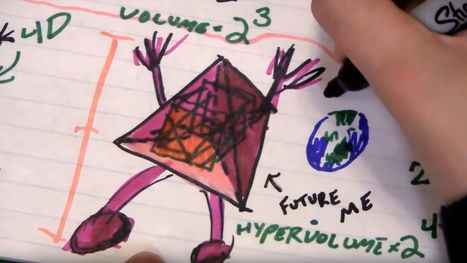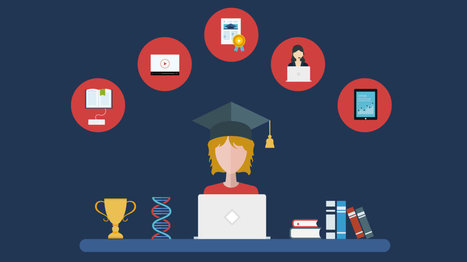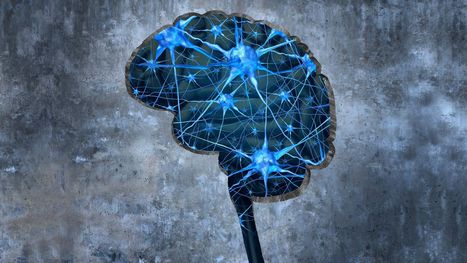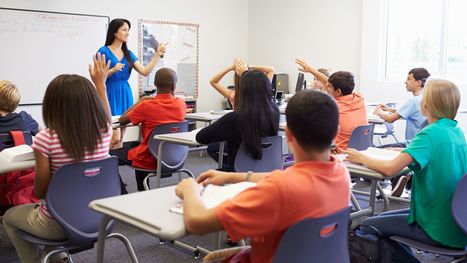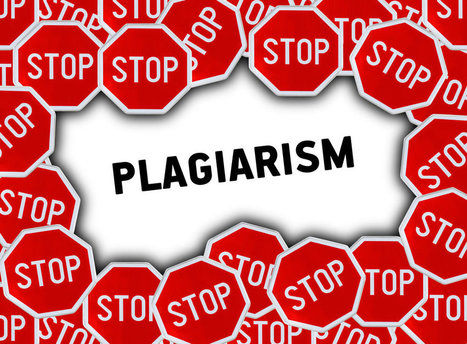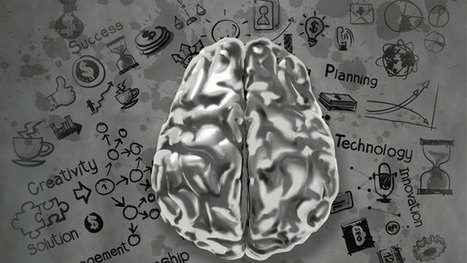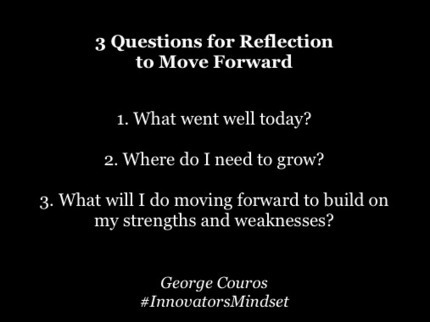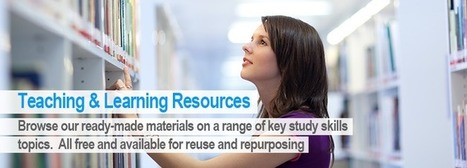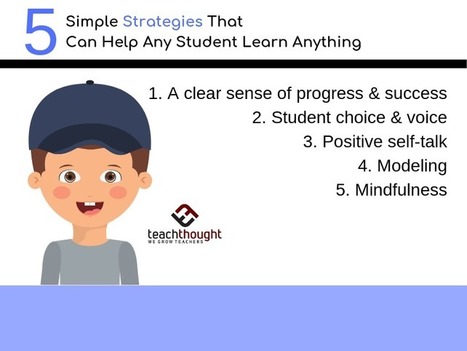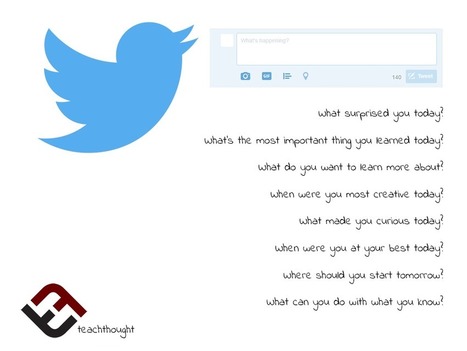 Your new post is loading...
 Your new post is loading...
It was soon after my son enrolled in a local junior college that I realized something was wrong. Success, which seemed to come so easy to him in high school, was suddenly out of reach. In fact, he was failing every course! I quickly learned that in high school he did not have to exert any effort and was taught to simply memorize material. Sadly, this high school experience resulted in a new high school graduate who had no concept of time management, study skills, or critical thinking (McGuire, 2015). He had no idea how to take responsibility for his own learning, and despite my pleas that he needed to “study differently” in college, he had no idea what this meant or how to go about this task.
It’s long been known that drawing something helps a person remember it. A new study shows that drawing is superior to activities such as reading or writing because it forces the person to process information in multiple ways: visually, kinesthetically, and semantically. Across a series of experiments, researchers found drawing information to be a powerful way to boost memory, increasing recall by nearly double.
Psychological Science in the Public Interest evaluated ten techniques for improving learning, ranging from mnemonics to highlighting and came to some surprising conclusions.
Sometimes the details former students recall from class is nothing short of amazing. A few years ago I had a student named Abby in my history class
As a professor of cognitive psychology, I teach about memory, especially about when and why our memories often fail us. Students are excited to apply this material to their everyday lives.
Teachers have long known that rote memorization can lead to a superficial grasp of material that is quickly forgotten. But new research in the field of neuroscience is starting to shed light on the ways that brains are wired to forget—highlighting the importance of strategies to retain knowledge and make learning stick.
Strategies that target students’ metacognition—the ability to think about thinking—can close a gap that some students experience between how prepared they feel for a test and how prepared they actually are. In a new study, students in an introductory college statistics class who took a short online survey before each exam asking them to think about how they would prepare for it earned higher grades in the course than their peers—a third of a letter grade higher, on average. This low-cost intervention helped students gain insight into their study strategies, boosting their metacognitive skills and giving them tools to be more independent learners.
Comprehension strategies are sets of steps that good readers use to make sense of text. Comprehension strategy instruction helps students become purposeful, active readers who are in control of their own reading comprehension. The seven strategies here appear to have a firm scientific basis for improving text comprehension.
Via Nik Peachey
Students write a lot, and the issue of plagiarism (or, at least, wrong paraphrasing) remains topical. As educators, what can you do to help students avoid the problem?
Quick, what’s the capital of Australia? No Googling! (And no points if you’re Australian—that means the information is more meaningful to you, which means you’re more likely to know it). Did you get it? Or are you sure you learned it at some point, but forgot right around the time that you forgot how the Krebs cycle works? In his new book, Learn Better, author and education researcher Ulrich Boser digs into the neuroscience of learning and shows why it’s so hard to remember facts like that one. Boser explains why some of the most common ways we try to memorize information are actually totally ineffective, and he reveals what to do instead.
Teaching students good learning strategies would ensure that they know how to acquire new knowledge, which leads to improved learning outcomes, writes lead author Helen Askell-Williams of Flinders University in Adelaide, Australia. And studies bear this out. Askell-Williams cites as one example a recent finding by PISA, the Programme for International Student Assessment, which administers academic proficiency tests to students around the globe, and place American students in the mediocre middle. “Students who use appropriate strategies to understand and remember what they read, such as underlining important parts of the texts or discussing what they read with other people, perform at least 73 points higher in the PISA assessment—that is, one full proficiency level or nearly two full school years—than students who use these strategies the least,” the PISA report reads. Learn more / En savoir plus / Mehr erfahren: https://gustmees.wordpress.com/2014/10/03/design-the-learning-of-your-learners-students-ideas/ https://gustmees.wordpress.com/2015/07/19/learning-path-for-professional-21st-century-learning-by-ict-practice/
Via Gust MEES
Whether — and how — students take notes in class is an evergreen topic in discussions of teaching and learning. Unfortunately, I often find myself frustrated and annoyed when I’m explaining something in class and look out at a room full of students who are, admittedly, paying attention to what I’m saying but writing down not a single thing in their notes. Frustration and annoyance do not make for good pedagogy, though, and my off-the-cuff comments in response to this particular student behavior are probably among the reasons students often write in course evaluations that I’m too sarcastic. So in my teaching I’m working on front-loading an explanation of the relationship between what happens during class time — no, we’re not just having an unstructured conversation about things — and the designated learning outcomes of the course, as well as the role played by memory and such learning strategies as taking notes.
Education and cognitive science are largely separate worlds that have begun communicating only in the last decade, partly because “teachers see all sorts of reforms come and go, and they’re skeptical — and rightly so — of anyone who comes in and says, “Well, I’m going to tell you how to make the kids learn better,” he said.
Via Nik Peachey
|
Dan Russell and Mario Callegaro write: "Search engines are amazingly powerful tools that have transformed the way we think of research, but they can hurt more than help when we lack the skills to use them appropriately and evaluate what they tell us. "
Via Mary Reilley Clark
In positive psychology, ‘flow’ is a term used to describe the optimal state of consciousness. It’s in this state that we become so energised and absorbed by what we’re doing that all distractions fade into the background and the hours seem to fly by.
“Student Voice” is something that many schools are focusing on and for a good reason. If we, as educators, understand that we serve our students and not the other way around, getting their thought and feedback for not only problems but solutions in moving our schools forward, is crucial. From my experience though, I have seen a lot of money, time, and effort, in getting thoughts and feedback from students, listening to their voice, and then often, no action based on what they have shared. Dean Shareski wrote a challenging post on this and shared the following thoughts on “Student Voice”:
Learnhigher is a network for promoting and facilitating the development and dissemination of high quality, peer-reviewed resources for learning development in the higher education sector. We aim to support the development of such resources as well as conduct and disseminate research into the use and effectiveness of learning development strategies and materials.
Empowered with some basic information about how the mind and brain work during learning, teachers can plan to use some new strategies for supporting high student achievement.
Through the years we have facilitated the use of brain-based strategies that help foster growth mindsets through the internalization of learning successes, individual choice, positive self-talk, and teacher modeling. Teachers tell us that using these teacher-friendly tools can jumpstart the learning process early in the year.
What exactly is flow? Imagine for a moment that you are running a race. Your attention is focused on the movements of your body, the power of your muscles, the force of your lungs, and the feel of the street beneath your feet. You are living in the moment, utterly absorbed in the present activity. Time seems to fall away. You are tired, but you barely notice.
According to positive psychologist Mihály Csíkszentmihályi, what you are experiencing in that moment is known as flow, a state of complete immersion in an activity.
How an engineering professor who “flunked my way” through high school math and science went on to create the world’s most popular online course.
Via Mark E. Deschaine, PhD
Learning - that elusive moment when things make sense.
Learning - that inclusive moment which allows one to become a member of a specific group.
Learning - how does one learn today?
For 10 years, I’ve been teaching study skills to college students, both individually and in the classroom. The vantage from my office offers me a clear view of students devouring information during tutoring appointments and focusing intently on the strategies shared during study skills counseling sessions. The effort and time they pour into comprehending their course material is irrefutable. However, when I ask students what they know about the lecture’s content before arriving at class, the answer is almost always the same: “Nothing.”
When we look at what research says about becoming better at something, two pieces of evidence stand out.
First, we must have clarity on what our goals are, and where we want to go or what we want to become.
Second, it is deliberate practice (combined with feedback loops) that increase the myelin in our brain and in turn help improve performance and growth.
Via Nik Peachey
Near the end of August, the 2014 Business Insider article “10 Things Every College Professor Hates” started circulating on Facebook again. I had just finished the syllabus for my introductory English linguistics class and was feeling excited to be headed back into the classroom. Yet here was this article, which felt so negative. It didn’t come across as entirely respectful of all that students bring to the table. And the piece, aimed at students about “interacting with your professor or teaching assistant,” seemed to give more attention to pleasing the professor than to real learning.
What’s the big deal about thinking about something that already happened? In our ’10 Characteristics Of A Highly-Effective Learning Environment‘, we suggested that learning habits–reflection, for example–were constantly present and modeled.
|



 Your new post is loading...
Your new post is loading...



